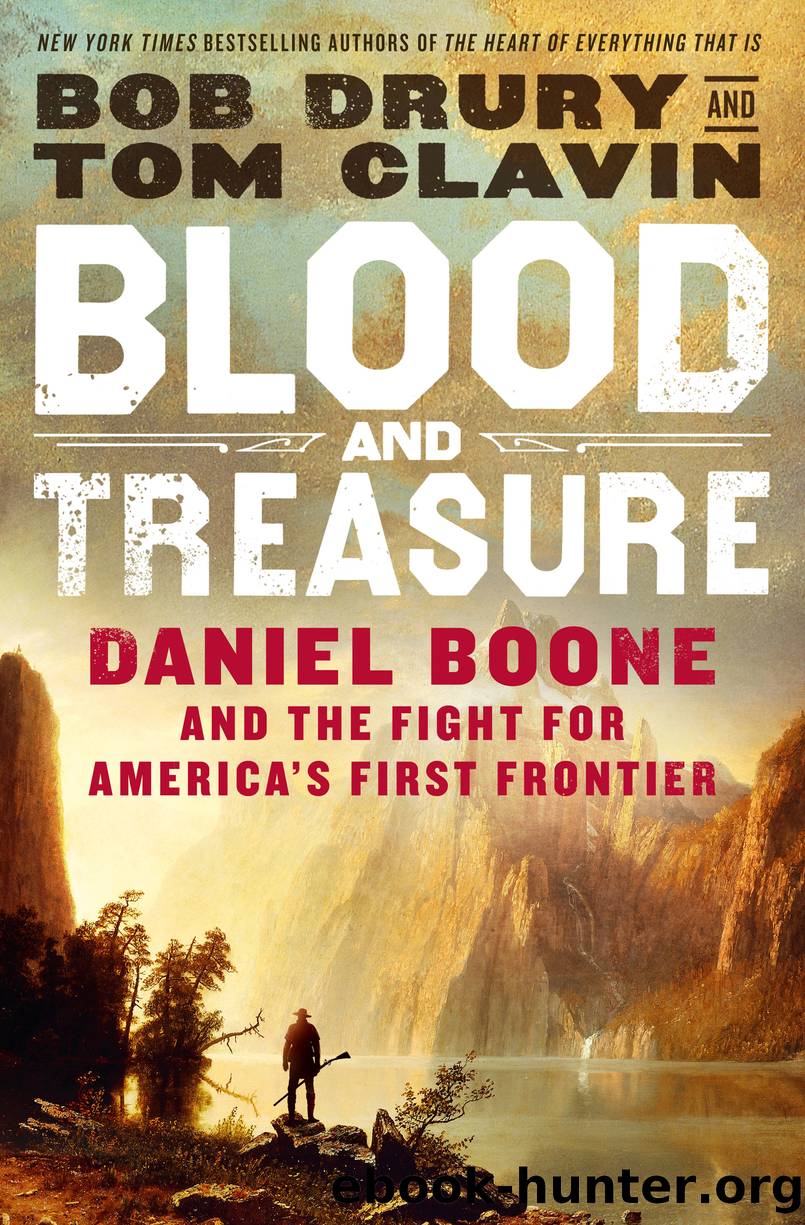Blood and Treasure by Bob Drury

Author:Bob Drury
Language: eng
Format: epub
Publisher: St. Martin's Publishing Group
* * *
In March 1775, two months before Richard Henderson accepted his symbolic slice of Kentucky soil, Virginiaâs governor, Lord Dunmore, dispatched an emissary to the Cherokee towns to inform them of his decision to declare the Transylvania Purchase illegal. His reasons were a mix of the political and the personal. On the one hand, the English Crown, through its representative in the royal governorâs office, had prohibited private companies from buying Indian territories, in no small part for fear that the frontier, once viewed as a safety valve to siphon excess laborers from eastern lands, would now begin to denude its colonies of their most productive citizens. The governor had few qualms about emptying his colony of men of little consequence and less taxable property. But now, Dunmore worried that the acreage claimed by squatters would impinge upon his own land speculations.
When news of Lord Dunmoreâs intrigues reached Kentucky, the pioneers delivered a message of their own: any attempts by royal surveyors to âstretch the chainâ near their western settlements would be met with powder and shot. In the meanwhile, the governorâs representatives in Cherokee country found the tribe already experiencing second thoughts about the âdeceptionâ that had cost them their hunting grounds.
An American trader living among the tribes reported that Little Carpenter and his fellow negotiators had been under the impression that it was not the Kentucky River that marked the purchaseâs northern boundary, but a different watercourse altogetherâthe smaller Louisa, a tributary of the Big Sandy some 125 miles to the east. And in what can be interpreted as a tribal-wide grievance, an influential warrior who had received but a single linen hunting shirt and several gills of rum for his âshareâ of the âGreat Grantâ complained that he could kill more deer in a day in the forest and fields of Kanta-ke than the garment was worth. He soon departed with his family to join Dragging Canoeâs growing throng of disaffected tribesmen.
News from the north was no more encouraging. In the late spring of 1775, Booneâs old friend Capt. William Russellânow posted on the Ohio River at the fort erected in the wake of the Battle of Point Pleasantâsent a warning to Boonesborough: factions of the Shawnee and Mingo bands who had never recognized the legitimacy of the Treaty of Camp Charlotte were preparing to rise against the white âcabinersâ along the Kentucky River. The Indians throughout the Ohio Country, Russell wrote to Boone, were aware of the violent rupture between the Redcoats and the American colonials near Boston. They hoped to use what they viewed as the white manâs civil war to reclaim their âstolenâ land.
In the early stages of the conflict between colonies and mother country, Great Britainâs official Indian policy had been to restrain the northwest tribes from entering the fray. But now, Russell confided to Boone he feared that in the wake of the recent engagements at Concord and Lexington, rogue British agents from Detroit were already circulating among the Native Americans in an effort to turn them toward a warpath that led to Boonesboroughâs front door.
Download
This site does not store any files on its server. We only index and link to content provided by other sites. Please contact the content providers to delete copyright contents if any and email us, we'll remove relevant links or contents immediately.
Blood and Oil by Bradley Hope(1250)
Daniel Holmes: A Memoir From Malta's Prison: From a cage, on a rock, in a puddle... by Daniel Holmes(1117)
Ambition and Desire: The Dangerous Life of Josephine Bonaparte by Kate Williams(1087)
Wandering in Strange Lands by Morgan Jerkins(1018)
It Was All a Lie by Stuart Stevens;(941)
What Really Happened: The Death of Hitler by Robert J. Hutchinson(870)
London in the Twentieth Century by Jerry White(848)
Time of the Magicians by Wolfram Eilenberger(844)
Twilight of the Gods by Ian W. Toll(813)
The First Conspiracy by Brad Meltzer & Josh Mensch(812)
The Japanese by Christopher Harding(799)
A Woman by Sibilla Aleramo(796)
Lenin: A Biography by Robert Service(780)
The Devil You Know by Charles M. Blow(779)
Reading for Life by Philip Davis(774)
Twelve Caesars by Mary Beard(768)
Cleopatra by Alberto Angela(766)
1965--The Most Revolutionary Year in Music by Andrew Grant Jackson(715)
The Life of William Faulkner by Carl Rollyson(713)
